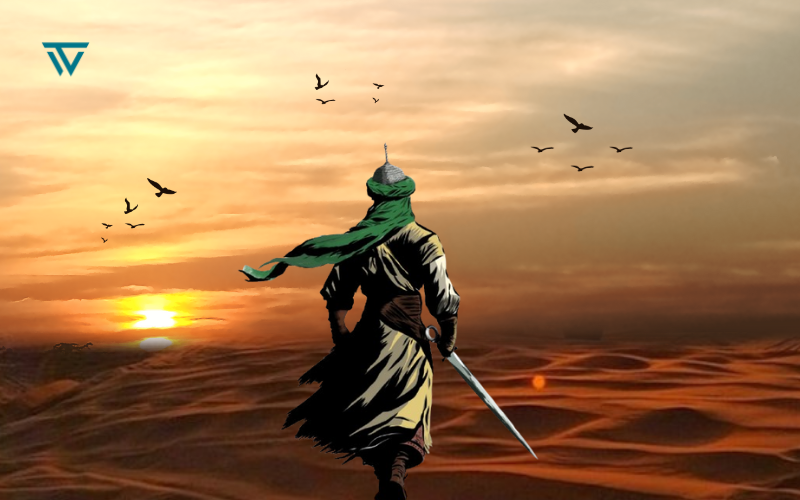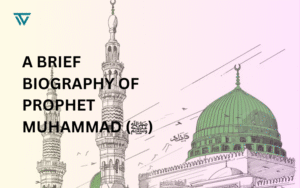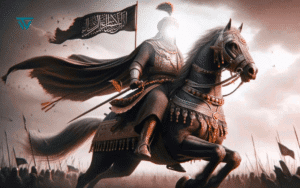Hazrat omar ibn khattab (RA) the second Caliph of Islam

0 people are currently reading this article
Hazrat Omar ibn Khattab (RA), born approximately in 583 and martyred in 644 of the Common Era, holds an unparalleled position as the second Caliph of Islam. Revered as a pivotal and exceptionally influential figure among the Rashidun Caliphs – those “rightly-guided” successors to Prophet Muhammad (peace be upon him) – he was honored with the title Al-Farooq for his remarkable ability to distinguish truth from falsehood.
Before embracing Islam, he was a prominent and respected leader of the Qurayshi tribe. Afterward, he rose to the position of a just and visionary Caliph, making remarkable contributions to Islamic history. His intellect, bravery, unwavering sense of justice, and administrative excellence turned him into a symbol of exceptional leadership. Every phase of his life remains a timeless example of justice, leadership, and devotion for the Muslim world.
His name resonates through the corridors of history as a paragon of acute intellect, formidable courage, unwavering integrity, and remarkably insightful administrative capabilities. His life’s trajectory marks a profound transformation: from a respected Qurayshi leader before Islam, to a celebrated and just Caliph. Consequently, his actions, decisions, and character continue to serve as a deep and enduring model of leadership, justice, and piety for Muslims across the globe.
Early Life and Opposition to Islam
Hazrat omar ibn khattab (RA) entered the world into the distinguished lineage of the Banu Adi clan, a significant branch of the esteemed Quraysh tribe residing in the bustling city of Mecca. His father was Khattab Ibn Nufayl, a man known for his strength and resolve, while his mother was Hantama bint Hisham, connecting him to another notable Meccan family. From his earliest years, omar ibn khattab (RA) was endowed with a robust physique and a remarkably keen intellect, traits that would serve him well in the trials and triumphs ahead. He demonstrated a natural aptitude for the physical pursuits valued in Arabian society at the time, excelling in disciplines such as wrestling, where his strength was legendary, and archery, demanding precision and focus.
Beyond his physical prowess, he was also recognized for his compelling eloquence and an unwavering commitment to straightforwardness in his speech and dealings. Prior to the transformative moment of his conversion to Islam, Hazrat omar ibn khattab (RA) stood as a staunch and vocal opponent of the nascent faith. As a prominent and influential figure within the Meccan elite, he actively participated in the efforts to resist its spread and maintain the traditional beliefs and power structures of the time. His stern and uncompromising stance against Islam created an atmosphere of apprehension and challenge for the early Muslim community during those formative years.
The Transformative Conversion of Hazrat Omar ibn Khattab (RA)
The narrative of Hazrat Omar ibn Khattab’s (RA) conversion to Islam stands as a truly significant turning point, not only in his personal history but also in the broader unfolding of Islamic history itself. Historical accounts, passed down through generations, vividly describe the circumstances surrounding this pivotal event. Initially driven by a fierce opposition to the new faith, this future second Caliph of Islam embarked on a determined mission with the intention of nothing less than the assassination of Prophet Muhammad (peace be upon him). However, fate intervened in a profound and unexpected manner.
A Mission of Hostility Turns Inward
On his journey towards this fateful encounter, he was informed of the clandestine conversion of his own sister, Fatima (RA), and her husband, Sa’id Ibn Zayd (RA), and their secret engagement with the recitation of the Qur’an, the divine scripture of Islam. Consumed by rage and a sense of betrayal of his ancestral traditions, he redirected his steps towards their home.
The Power of Revelation
It was within those humble walls that he encountered the transformative power of the Qur’anic verses, specifically those of Surah Ta-Ha. The sheer beauty, the profound wisdom, and the undeniable truth embedded within the divine words resonated deeply within his once hardened heart. The physical confrontation that preceded his reading of the scripture gave way to a deep spiritual awakening. This encounter triggered a profound internal shift—a complete metamorphosis of his convictions.
From Opposition to Acceptance
Recognizing the error of his previous path and the undeniable truth of Islam, he experienced deep remorse for his past actions. In a moment of profound surrender and conviction, he turned his steps directly towards Prophet Muhammad (peace be upon him) and, in his presence, unequivocally declared his acceptance of Islam. His declaration not only shocked those around him but also symbolized a significant breakthrough for the Muslim cause.
A Catalyst for Courage
Hazrat Omar ibn Khattab’s (RA) conversion acted as a monumental catalyst for the fledgling Muslim community, providing a significant boost both in terms of morale and physical strength. His fearless nature and unshakeable resolve served as a protective force for the previously persecuted Muslims.
Public Practice of Faith Begins
Following his powerful embrace of Islam, the Muslims—who had previously practiced their faith in secret and fear—gained the newfound courage to pray openly and publicly within the sacred precincts of the Kaaba. His presence emboldened the believers, and the momentum for the propagation of Islam experienced a substantial surge forward.
Hazrat Omar ibn Khattab’s (RA) Association with the Prophet Muhammad (PBUH)
After embracing Islam, Hazrat omar ibn khattab (RA) dedicated himself to remaining a steadfast and unwavering companion of Prophet Muhammad (peace be upon him). He quickly became a trusted confidant and a close advisor. The Prophet (peace be upon him) frequently sought his counsel and deeply valued his opinions. Hazrat Omar Ibn Khattab (RA) demonstrated sharp intellect, remarkable insight, and a natural ability to understand the deeper implications of various situations. Many Hadiths—the sayings and traditions of the Prophet (peace be upon him)—clearly record these qualities in numerous instances.
He actively and valiantly participated in all the pivotal military engagements that defined the early years of Islam. These included the crucial Battles of Badr, Uhud, and the defensive Battle of Khandaq (the Trench), where he demonstrably risked his own personal safety and well-being for the noble advancement of the Islamic cause. His profound and unwavering devotion to the Prophet (peace be upon him), coupled with his unswerving fidelity to the principles of Islam, were qualities that were consistently beyond reproach and served as an inspiration to the entire Muslim community.
The Caliphate: Governance and Expansion
After the sad demise of Hazrat Abu Bakr (RA) in 634 CE, the leading figures of the early Muslim community elected Hazrat Omar Ibn Khattab (RA) as his successor through widespread consensus. He soon became universally recognized as the second Caliph of Islam. This marked a critical and transformative juncture in the consolidation and future direction of the nascent Islamic state. His subsequent tenure as Caliph is widely and historically regarded as a true zenith of equitable governance, remarkable administrative efficacy, and unprecedented territorial expansion. omar ibn khattab (RA) dedicated himself with an unwavering and profound commitment to the welfare and well-being of his entire constituency. He also rigorously and meticulously implemented the tenets and principles of Islamic Sharia (law) across the expanding dominion, consistently endeavoring to safeguard the fundamental rights and privileges of all his subjects, regardless of their social standing or religious affiliation.
Administrative Reforms Under omar ibn khattab (RA)
During the significant tenure of Hazrat omar ibn khattab’s (RA) caliphate, the Islamic dominion experienced a period of remarkably rapid and extensive territorial growth. To effectively and efficiently administer this increasingly expansive realm, the second Caliph of Islam astutely instituted a comprehensive series of seminal and groundbreaking administrative reforms that laid the very foundation for the future governance of the vast empire.
Provincial Demarcation and Oversight
Recognizing the challenges of governing such a large territory, he strategically divided the Islamic empire into distinct and manageable provinces. These key administrative units included important regions such as Kufa, Basra, Sham (Syria), and Egypt. To ensure just and effective rule, he meticulously appointed governors who were known for their piety, competence, and integrity to oversee each of these provinces. Furthermore, in a move to ensure accountability and prevent corruption, he also established a dedicated cadre of supervisory officials whose primary task was the regular and thorough monitoring of the activities and conduct of these appointed governors.
Central Administration and Key Departments
Understanding the need for a cohesive and unified governance structure, Hazrat omar ibn khattab (RA) established a robust and centralized administrative framework in the capital. This central authority was designed to effectively manage the critical affairs of the burgeoning state. To streamline operations and ensure specialization, various specialized departments were meticulously instituted. These included the treasury (Diwan al-Kharaj), responsible for managing state revenues and expenditures; the military administration (Diwan al-Jund), tasked with organizing and maintaining the growing armed forces; and the judiciary (Qada), responsible for the fair and impartial administration of justice.
Fiscal Management, Military Organization, and Justice System
Recognizing the importance of a sound financial system, he institutionalized the Bayt al-Mal (the public exchequer or treasury) as the central repository for state funds. He also formulated explicit and comprehensive regulations governing the various revenue streams flowing into the treasury and the protocols for their responsible and transparent expenditure. He ensured the equitable and just collection of key Islamic financial obligations such as Zakat (obligatory charitable giving), Kharaj (land tax), and Jizya (a tax levied on non-Muslims in exchange for state protection and exemption from military service), and he meticulously oversaw the utilization of these funds for the collective welfare and benefit of the entire populace.
To maintain order, secure the expanding borders, and project the strength of the Islamic state, Hazrat omar ibn khattab (RA) established a regularized and highly disciplined military force. This involved ensuring the provision of appropriate and timely remuneration and comprehensive logistical support for the soldiers. He also strategically established key military garrisons in various parts of the empire to facilitate rapid deployment and effective defense.
Recognizing that justice is the cornerstone of good governance, he underscored the absolute imperative of establishing an autonomous and completely impartial judicial system. He diligently appointed learned, capable, and God-fearing individuals as judges (Qadis) and promulgated clear and comprehensive legal guidelines for their adjudication of disputes and legal matters. The Caliph himself remained accessible to the grievances of the common populace and actively sought to ensure the swift, fair, and equitable dispensation of justice in all matters.
Public Welfare and Intellectual Growth
Demonstrating a deep commitment to the well-being of his subjects, he allocated specific stipends and financial assistance for the indigent, the vulnerable, and those in need. He also prioritized and invested heavily in essential public works projects, including the construction and maintenance of vital thoroughfares and roads, the crucial excavation of wells to provide access to clean water, and the establishment of caravanserais (rest houses) to facilitate trade and travel. Furthermore, recognizing the importance of intellectual growth and societal progress, he actively fostered the advancement of education and the pursuit of knowledge throughout the realm.
Territorial Expansion under Hazrat Omar ibn Khattab (RA)
Under the dynamic and strategically astute leadership of Hazrat omar ibn khattab (RA), the Muslim armies achieved a series of unprecedented and historically significant military successes. These remarkable conquests encompassed the complete subjugation of the vast and ancient Persian Empire. They also included the acquisition of significant and strategically vital territories from the powerful Byzantine Empire, including the rich lands of Syria and the fertile plains of Egypt. The extensive expansion of Islamic influence across the northern regions of the African continent was also achieved.
Hazrat omar ibn khattab’s (RA) keen strategic military acumen, coupled with his exceptional ability to inspire and effectively lead his commanders and armies, proved instrumental in these truly remarkable achievements. In the year 638 of the Common Era, a particularly significant milestone was reached with the conquest of the holy city of Jerusalem. In a powerful display of humility and respect for the city’s religious significance, Hazrat omar ibn khattab (RA) himself entered Jerusalem in a simple and unassuming manner, setting a powerful precedent for the treatment of conquered lands and their inhabitants. These extensive territorial expansions played a pivotal role in the widespread dissemination of the tenets and influence of Islam across a significant portion of the known world.
Hazrat Omar ibn Khattab’s (RA) Unwavering Commitment to Justice
Hazrat Omar Ibn Khattab (RA) shaped his jurisprudential philosophy and practice around an unwavering commitment to the principle of equity. He firmly established and upheld a legal framework that treated the ruling elite—including himself and his family—no differently from ordinary citizens. He ensured that everyone within the expanding Islamic dominion remained equally accountable under the same comprehensive body of law. Numerous well-documented historical narratives and anecdotes vividly attest to his unwavering commitment to impartial judgments and the fair application of justice.
Justice Without Favor: A Caliph’s Own Son Punished
On one particularly notable occasion, demonstrating his absolute commitment to the rule of law, he personally administered public corporal punishment to his own son, Abu Shama. The reason was the serious transgression of alcohol consumption, based solely on the formal complaint lodged by an ordinary Bedouin. This remarkable act underscored the reality that even the Caliph’s own family was not exempt from legal accountability—justice applied equally to all.
The Night Walker: Seeking the Truth from the Streets
Furthermore, demonstrating his deep concern for the welfare of his subjects, he frequently undertook nocturnal perambulations through the streets of the capital in disguise. His purpose in these unannounced journeys was to personally ascertain the well-being of the ordinary people, to listen to their concerns firsthand, and to promptly address any grievances or needs that he encountered. This hands-on approach to governance reflected a rare humility and genuine empathy for the people under his care.
An Invitation to Accountability
In a powerful display of his commitment to transparency and accountability, he once stood before the general public and openly invited them to identify any shortcomings or deficiencies in his governance. He expressed genuine satisfaction and gratitude when an individual, regardless of their social standing, dared to offer constructive criticism or point out an error in his administration. His readiness to accept correction from any member of society demonstrated a level of moral leadership that transcended ego and authority.
Austere Yet Compassionate: Justice with Purpose
While his rigorous and unwavering adherence to the strict principles of justice occasionally manifested as a perceived severity, his underlying and overarching objective consistently remained the establishment and maintenance of societal harmony, the preservation of public order, and the implementation of truly equitable administration for all under his rule. His justice was never punitive for its own sake—it was a means to uphold dignity, fairness, and balance within the growing Islamic state.
Ascetic Lifestyle and Character
Despite presiding over a vast and rapidly growing empire that commanded significant resources and influence, Hazrat omar ibn khattab (RA) consciously chose to maintain a remarkably austere and profoundly ascetic lifestyle. He consistently exhibited no outward manifestations of arrogance, ostentation, or the trappings of worldly power. His personal attire was simple and unpretentious, reflecting his deep humility. His daily sustenance typically consisted of basic provisions such as dates and unleavened bread, demonstrating his detachment from material comforts.
He would frequently traverse the bustling marketplaces of the capital on foot, engaging directly with ordinary merchants, laborers, and citizens, inquiring about their well-being, and listening attentively to their concerns. His deep-seated humility, unwavering probity, absolute commitment to truthfulness, tireless dedication to his demanding duties as Caliph, and profound and unwavering faith in Allah served as an enduring and powerful paradigm for emulation by both his contemporaries and subsequent generations of Muslims. He remained perpetually and acutely cognizant of his ultimate accountability before the Divine for each and every one of his actions and decisions as the leader of the Muslim community.
Martyrdom and Legacy
In the year 644 of the Common Era, while leading the Fajr (dawn) prayers within the sacred and revered precincts of the Prophet’s Mosque in Medina, Hazrat omar ibn khattab (RA), the second Caliph of Islam, was the target of a treacherous assassination attempt. He sustained multiple critical injuries as a result of the attack, which was perpetrated by a Persian slave named Abu Lulu Firuz. Despite the best efforts to save him, Hazrat omar ibn khattab (RA) succumbed to his grievous wounds three days later, attaining the esteemed status of a martyr in the path of Allah.
His martyrdom represented a profound and deeply felt loss for the entire collective Muslim Ummah (community). An immense multitude of people, reflecting the deep love and respect they held for their just and compassionate leader, attended his funeral rites. Fulfilling his wish and with Aisha’s (RA) permission, the companions buried him beside the Prophet (peace be upon him) and Hazrat Abu Bakr (RA) in the Prophet’s Mosque—an honor that reflects his deep connection to the earliest pillars of Islam..
Exalted Status in the Qur’an and Hadith
The sacred text of the Qur’an and the extensive corpus of Hadith—the sayings and traditions of Prophet Muhammad (PBUH)—emphasize the extraordinary status and numerous virtues of Hazrat Omar ibn Khattab (RA). Although the Qur’an does not mention him by name, many respected Islamic scholars interpret certain verses as indirect references to his exceptional character, pivotal role in the early Muslim community, and the divine favor bestowed upon him.
Recognition by the Prophet (PBUH)
Within the rich and authoritative Hadith tradition, Prophet Muhammad (PBUH) openly acknowledged Hazrat Omar ibn Khattab’s (RA) remarkable intellect, unwavering faith, and immense contributions to the growth and consolidation of the Islamic community. Several profound prophetic statements bear testimony to his unparalleled stature:
Narrated Abdullah ibn omar (RA):
The Messenger of Allah (PBUH) said:
“If there were to be a Prophet after me, it would have been Omar.”
[Sunan al-Tirmidhi, Book of Virtues, Hadith No. 3686]
This powerful declaration highlights Omar’s (RA) profound intellect, steadfast devotion to truth, and remarkable alignment with divine guidance. It implies that if prophethood had not been sealed with Muhammad (PBUH), Hazrat Omar (RA) would have been uniquely qualified for such a noble station.
Narrated Sa’d ibn Abi Waqqas (RA):
The Messenger of Allah (PBUH) said:
“Indeed, Satan flees from Omar.”
[Sunan al-Tirmidhi, Book of Virtues, Hadith No. 3682]
This succinct yet impactful narration illustrates the formidable strength of Hazrat Omar’s (RA) faith. His unwavering righteousness and deep consciousness of Allah rendered his presence so powerful that even Satan himself would avoid him.
Narrated Hudhayfah ibn al-Yaman (RA):
The Messenger of Allah (PBUH) said:
“Abu Bakr and Omar are the best of my Ummah.”
[Sunan Ibn Majah, Book of Virtues, Hadith No. 97]
This definitive pronouncement elevates Hazrat Omar (RA) to the highest rank among the Prophet’s Companions, second only to Hazrat Abu Bakr (RA), underscoring his distinguished role and immense contribution to the establishment of Islam.
The Divine Affirmation: Muwafaqat-i-Omar
Historical records further confirm that on many occasions, the insightful counsel and judgments of Hazrat Omar (RA) on governance, legal jurisprudence, and societal matters were subsequently affirmed through divine revelation in the Qur’an. This extraordinary phenomenon earned him the honored title “Muwafaqat-i-Omar” (The Concurrences of Omar), which stands as a lasting testament to his profound wisdom, keen understanding of Islamic principles, and exceptional foresight in matters of faith and state.
To err is human. If this writing contains any mistakes, I humbly seek your gracious understanding and forgiveness. If you have any suggestions, you can contact. Or if you want to post your article. Write the article on Google Docs and share it with your name and email.
MD. Sujon Ahmed





